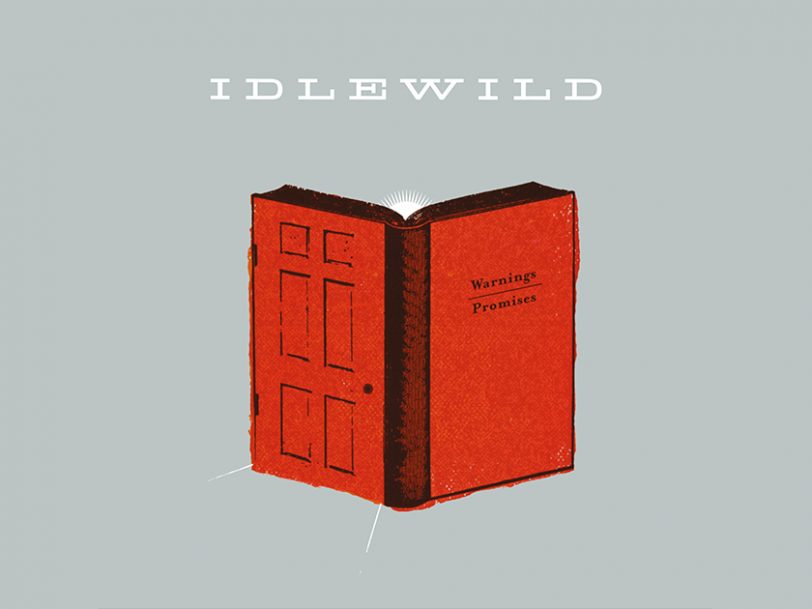By the time Idlewild recorded their fourth album, Warnings/Promises, in 2005, they’d established themselves as household names; reached the upper echelons of the UK album charts, where they shared space with the likes of Oasis and Red Hot Chili Peppers; and evolved from the early, angular, hardcore-punk-influenced recordings of their debut EP, Captain, to the more melodic, mature songwriting that characterised their third album, The Remote Part. But with labelmates such as Kylie Minogue and Coldplay to contend with, “There was pressure for the next record,” Idlewild frontman Roddy Woomble tells Dig! “‘The Remote Part’s got you to this point, now Warnings/Promises has got to get you into arenas, or make you properly popular’ – whatever that is.”
In the event, Warnings/Promises became significant in a different way for the group. “It established the idea of us being a collective of musicians rather than the kind of band that had to stay the same. We could morph into different things, which is more interesting,” Woomble says. “At that point, we knew we were a popular band, but Warnings/Promises made me realise that I was a life-long musician. This is what I did, and I could carry on doing it because I was good at it.”
Listen to ‘Warnings/Promises’ here.
“We were trying to work out a new way of being Idlewild”
In hindsight, Warnings/Promises’ predecessor, The Remote Part, kickstarted the series of events that led Woomble to this realisation. A pronounced move away from the sounds most people associated with Idlewild – fuzzed-up guitars, screamed abstract lyrics – it had revealed a softer, more introspective side of the group. “People saw the maturity and the development of ideas,” Woomble says. Under heightened expectations to follow through on that potential, Idlewild “were very focused on trying to make the next record as good as we could. But at the same time, we didn’t want to make The Remote Part 2. We wanted to do something different.” Their then label, Parlophone, supported their decision, but “wanted to be involved, hearing all the demos”, Woomble adds. “So there was a lot more scrutiny throughout that process, but we accepted that.”
Internally, too, Idlewild felt they had something to prove – not least because they had undergone significant personnel changes following the tour for The Remote Part.
“We had this great record in The Remote Part, but we were still a scrappy live band. We still existed in the past,” Woomble says. “And that didn’t really work when we were playing songs like American English or Live In A Hiding Place. We were getting these great festival slots, but just not being professional – we weren’t rising to the challenge.” Frustrated, Bob Fairfoull, the group’s bassist since 1997, left part way through the tour, resulting in “a challenging few months” during which the group’s then bass technician, Alex Grant, took over. “It was like a three-legged dog – we limped over the finishing line, rather than running over it,” Woomble says.
Installing touring guitarist Allan Stewart as a permanent band member and replacing the departed Fairfoull with bassist Gavin Fox expanded the four-piece to a five-piece, “So, effectively, Warnings/Promises was a new line-up,” Woomble says. “So that had something to prove, too. There was an extra element of: this new album’s not just the follow-up to The Remote Part. It’s the follow-up to our most successful record, with a new band that we’re trying to make the fans like. So there was a lot of internal pressure. Gavin and Allan felt like they were going to be judged unless the record was really, really good.”
“It was one of our most creative periods”
Looking to recapture the creative freedom the group had enjoyed during their most productive songwriting sessions for The Remote Part, for which they hired a cottage in the Scottish Highlands, Idlewild decamped to a house in Glenelg, in North West Scotland, where they worked on new material. “Any ideas that we came up with that were deemed too similar to things we’d already done were dismissed,” Woomble says. “And it was one of our most creative periods, because of that reason.” However, initial recording sessions in Tambourine Studios, in Malmö, Sweden, didn’t quite capture that feeling.
“A lot of the tunes had an almost Highland folk-song atmosphere to them, and I really wanted to record them somewhere cold,” Woomble explains of the decision to relocate. “I consider myself to be Northern European – I love Scandinavian literature and music, and dark nights and snow on the ground, and we’d never delved into recording our music in that kind of environment. I thought it might really influence it well.” After returning to the UK with five finished songs, however, Parlophone were “a bit underwhelmed by it all”, Woomble admits. “And we were basically back to square one, thinking, Right, OK. We need to start writing songs again… And we re-evaluated what we were doing.”




